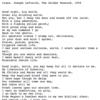4: Poem, "Back to the Ghetto," Joseph Leftwich's translation of Yankev Glatshteyn's "Good Night, World," 1939.
Joseph Leftwich, the first translator of "Good Night, World," made a number of choices that make his translation different from both the Yiddish source text and from other translations.
Suggested Activities: Have students begin by looking at the title Leftwich gave his translation. Why might he have chosen this title for the work, even though it is not a direct translation of Glatshteyn's title? What does this title signal to the reader? Then have students read through Leftwich’s translation and the Harshavs' translation (in resource 1 of this kit). What differences do they notice in word choice and syntax? What does each translation offer?
Leftwich chose to leave out the lines in which Glatshteyn calls our attention to Germans, Poles, and Amalekites. (According to the Hebrew bible, the Amalekites were early enemies of the Jews.) Why do you think he left out these lines? How do the Harshavs name these enemies? What is the effect of that naming?
Sources: Yankev Glatshteyn, “Back to the Ghetto,” trans. Joseph Leftwich, The Golden Peacock (London: Robert Anscombe and Co., 1939), 332–333.
Editor's note: We have not been able to make contact with the rights holders for Joseph Leftwich's translation. Any information about the current copyright holder for this material would be welcome and appreciated.
Back to the Ghetto (Leftwich)
 Download image (86.23 KB)
Download image (86.23 KB)

